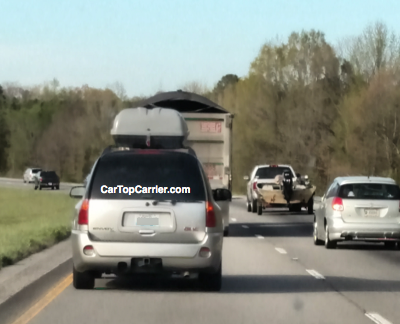 However, there are many types of cargo carriers to choose from, and it can be hard to decide on the best model for your needs. That’s why doing a bit of research in advance can help you to choose the perfect travel accessory for your car and your lifestyle.
However, there are many types of cargo carriers to choose from, and it can be hard to decide on the best model for your needs. That’s why doing a bit of research in advance can help you to choose the perfect travel accessory for your car and your lifestyle.
Which Type of Cargo Carrier is Right for You?
There are two basic styles of cargo storage for your vehicle: car top carriers and hitch cargo carriers.
A car top carrier sits on a roof rack. This rack is bolted to the roof of the vehicle. Many cars come with roof racks already installed, making these carriers easy to use; you simply have to put it in place and secure it. If your car does not already have a roof rack, you can have one professionally installed. However, bear in mind that this will be a permanent fixture of your vehicle.
A hitch carrier uses a rack that attaches to the tow hitch of the car. Once the bottom rack is locked into place, a cargo container can be placed on top. The hitch carrier can also be used to carry other things, from propane tanks to wheelchairs. However, while the carrier is in place, the hitch cannot be used for pulling a trailer.
There are benefits and drawbacks to both styles of carrier. Depending on your needs, you may prefer one over the other.
Things to Consider When Selecting a Cargo Carrier
Rooftop carriers provide more storage space and are compatible with a wider range of vehicles. Not every car has towing capabilities, but any car can have a roof rack installed. When not used for a cargo bag or carrier, the roof rack can also be used for bicycles or other sporting equipment.
When shopping for a carrier, there are several factors to consider:
Style: Whether you choose a rooftop or rear-mounted carrier will depend on your personal needs and preferences. If your vehicle does not have tow hitch capabilities, your choice may already be made for you. However, some cars do have a tow hitch even if they are not able to tow a trailer; check your manual for more information. Either way, you’ll want to start your search by choosing the type of carrier that best suits your needs. You will also want to decide whether you want a hard-shell cargo box or a soft-sided cargo bag. You will also want to consider the shape of the carrier and how it might affect the aerodynamics of your car. If your vehicle has a relatively low profile, this might not matter; if your car is already tall or boxy, a lower profile carrier might be helpful in reducing wind resistance.
Size: You’ll want a carrier that fits the vehicle. The largest rooftop models average around 12 to 18 cubic feet, but smaller and flatter carriers are available as well for a more aerodynamic option. Remember that anything you put on the roof will modify the car’s profile, which could affect your gas mileage. The additional weight may also affect your vehicle’s performance. Be sure to check your car’s manual for guidance, and buy a carrier that fits within your vehicle’s capacity.
Security: Because your carrier will be on the outside of the vehicle, you’ll need it to be secured. A good carrier will be made from a sturdy material that can’t be easily torn or broken. You should be able to lock it with a padlock. Additionally, you may wish to find a water-proof model that will keep your belongings safe in any type of weather.
Accessibility: Reaching a roof mounted container can be a challenge, especially on a taller vehicle. This is one reason you might choose a rear-mounted hitch cargo carrier. Whichever style of carrier you choose, be sure it can be easily opened and shut and that you can reach inside to remove whatever is stored within it.
Price: As with any investment, price is a factor when considering a cargo carrier. It’s important to choose something that fits your budget. However, consider the lifespan of the carrier you choose, and remember that you will often get what you pay for! Look for quality manufacturing and materials. You might pay slightly more for a carrier that’s built to last, but it will save you money in the long run if you don’t have to replace it.
The same considerations apply to any type of carrier you choose, whether you’re looking at a large-capacity roof top model or a smaller soft-sided cargo bag. By considering your needs and assessing the available carriers on the market, you can find the right match.
Choosing the Right Cargo Carrier
Looking for a cargo carrier can become confusing, especially if you’ve never shopped for one before. It can help to seek out consumer reviews that will make it easier to identify whether a particular model is right for you. When you can see clearly what features a particular carrier has and what its drawbacks or limitations might be, you can make an informed decision.
It also helps to narrow down your choices to the top brands. When you look only at carriers that are made to last and have a proven track record of quality, you know that you won’t make a bad choice. You can focus your search on finding the best option for your specific needs without worrying whether you’re choosing a carrier that might fall apart with use.
If you’re looking for a place to start with your search, these reviews can help.